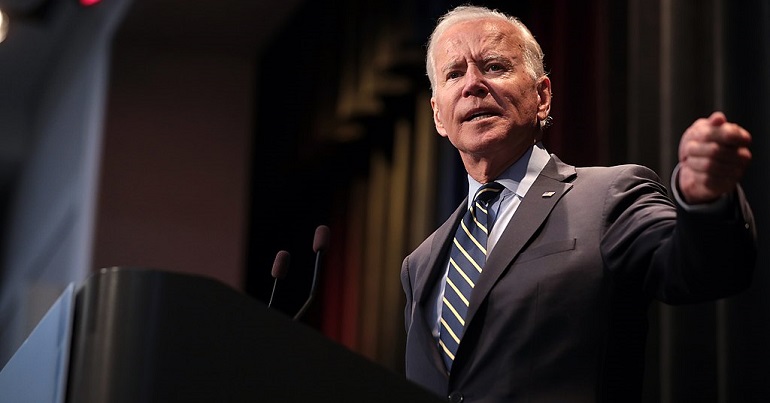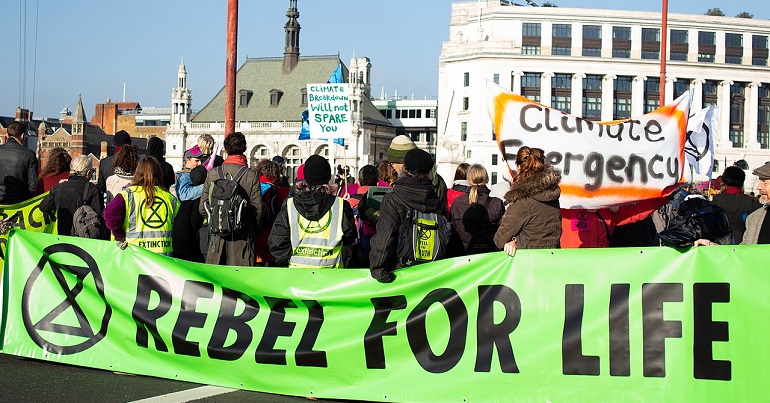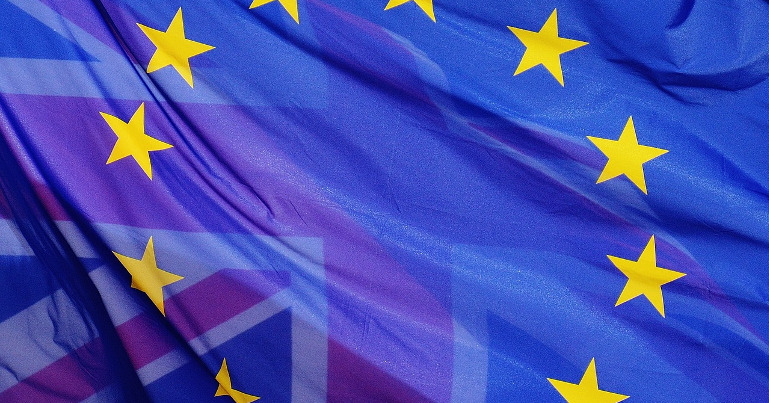‘In danger of being a lame duck from day one’ – Reinhard Bütikofer on Biden’s Presidency

This interview with Reinhard Bütikofer, Green MEP and spokesperson on relations with the US and China, was first published in the Green European Journal.
This US election has been a nailbiter. It has been far from a landslide for Biden and has gone down to the wire in several states. What does this tell us about the state of the US?
Reinhard Bütikofer: Indeed, it’s been a nailbiter’s nailbiter. After days of vote counting, Biden’s victory has been called. Trump’s refusal to concede will not change the course of events. No doubt, it is an immensely important victory. I am more than glad about it, relieved, elated by new hopes. But it is also a weak victory. We cannot deny that Trumpism is here to stay. Trump received more than 70 million votes, more than any Republican candidate ever had. It makes him the second most-voted person – just behind Biden – in the history of American presidential elections. It stabilises Trump’s claim that what he stands for has become part of the American mainstream.
What does he stand for?
Trump has managed to build an improbable coalition between corrupt corporate interests, extreme and paranoid quarters of the religious right, and a strong element of utterly disgruntled working-class citizens, especially in the countryside. This new, potent and dangerous coalition is populist on one hand, claiming to drain the swamp, while it has been deepening and watering the swamp beyond imagination on the other hand. Trump has transformed the Republican Party into a Trump movement, commanding the Republican Party’s members as his foot soldiers. That means, hardly any Republican with political ambitions will be successful in the coming years without the support of that political force.
What does that mean for the new Biden administration?
I expect the Republicans – especially if they hold on to their majority in the senate – to be completely obstructionist, just like they were from day one during Obama’s presidency. I am afraid that Biden’s rhetoric of building bridges will only go part of the way in dealing with that. In fact, it has only had relatively little success during the campaign. According to one poll, only 19 per cent of Biden voters back him because they believed in his rhetoric of reconciliation. His message did resonate and, in this regard, it was terribly important. The Democratic Party has hardly ever been as united as they were during this campaign. That Biden refused to take a clear stance on many issues on which Democrats love to disagree helped that unity. The conflict between the moderate and the more liberal wing in the Democratic Party has already begun to resurface.
Biden is in danger of being a lame duck from day one. He could be stuck between the rock of an unforgiving Republican opposition and the hard place of internal Democratic contradictions. The huge federal debt and a very conservative Supreme Court will limit his political space, and his big legislative plans might face a stalemate. Policymaking will have to rely mostly on executive action rather than legislative majorities. But will Biden be able to use executive actions to create the basis for a new convergence in American society in reality not just in rhetoric? Will he be successful in addressing some of the concerns of the Trump constituencies in the countryside while not disappointing the constituencies who carried him to victory, like black women who voted for him 90 per cent? If he cannot give a new glimmer of hope to Trump voters, who were led by a mixture of despair and demagoguery to follow their worst racist, misogynist instincts, if he cannot show them that there might be another way of being respected and recognised, then I don’t think he can overcome the deep divisions. It will be particularly difficult to make the Beltway adequately address the divisions between the countryside and the big cities. This all sounds insurmountable, but it’s what Biden has in front of him. Hopefully, strong grassroots movements will help him with that.
Who is the real winner of this election?
One winner certainly is Stacey Abrams. She’s a black, not-yet-fifty, Yale-educated lawyer who was defeated narrowly for the governorship in Georgia two years ago. But instead of giving up, she went on to organise the Fair Fight Action group and register 800 000 new Democratic voters. That registration drive was the basis of the turnaround in Georgia. It’s a sign that the renewal of American politics has to grow from the grassroots, it cannot be engineered from Washington or the Beltway.
It’s been a rollercoaster ride for the transatlantic relationship during the Trump presidency. How will this relationship move on with a Biden administration? Some European capitals seem complacent.
Complacency is the most convenient way to hell. Obviously, Biden brings a more welcomed approach. He values partnership and alliance. He also listens. He is a supporter of EU unity. But as I mentioned, he’ll be constrained by his domestic situation. If he doesn’t want to be an utterly unsuccessful president, he has to deal with American domestic concerns first. The level of energy and attention that he can dedicate to foreign policy will be limited. And whatever attention he will give to foreign policy will be concentrated towards the Indo-Pacific region. The transatlantic relationship will not be number one on his agenda. Biden will expect Europe to play a stronger role in promoting and stabilising its own security. Maybe he won’t be as insistent as Trump in calling on Europe to meet the two per cent defence expenditure target that NATO members have agreed upon, but he won’t relent on the demand that Europe does more.
Trade matters will not be easy either. He might avoid additional escalation, but I don’t expect Biden to, for instance, lift the illegal tariffs on European aluminium and steel any time soon. The trade policy that Trump has put in place is quite popular with a relevant segment of the Democratic electorate. Just a year ago, I spoke to the president of the American trade union AFL-CIO and he had shining eyes when he described Trump’s trade policy to me. These tensions won’t just disappear. Or look at Iran policy: I don’t see a Biden administration investing much political capital in reinstating the Iran deal. Where we will see a momentous reversal is on the Paris climate accord. Biden has promised that he’ll bring the US back into the Paris Agreement and he is also likely to reverse Trump’s decision to leave the World Health Organization. On these two fronts, there will be new opportunities of fruitful cooperation with the USA.
With Biden bringing the US back into the Paris climate accord, how could that invigorate transatlantic climate cooperation?
Biden bringing the US back into the Paris Agreement has great symbolic significance. It is a major victory for the global climate movement and reinforces the fundamental climate consensus that was struck five years ago. But what it will mean in practical terms remains to be seen. Whether Biden will manage to realise his ambitious climate plans depends on the legislative majorities, and the picture doesn’t look good. However, there might be two other avenues for climate progress. The first is subnational climate cooperation. We Greens have long argued that there is significant room for cooperation on climate policy beyond Washington DC, for example, between regions, federal states, and metropolitan areas. The German state of Baden-Württemberg has implemented a very successful climate cooperation with California. This Under2 Coalition now has more than 100 regions on board. The Biden presidency could encourage such cooperation and not stand in its way. The second approach is of course executive actions and ensuring that the US Environmental Protection Agency rules are stringently complied with. Trump had emptied or reinterpreted the rules to give corporate fossil interests and other polluters a field day. This needs to be overturned and the rules made to stick again.
Is the transatlantic relationship even a European priority? After all, there is ongoing debate in Europe about European sovereignty, autonomy, and independence.
Europe does need greater strategic capabilities. But the talk of European autonomy, autarky or sovereignty, whatever they call it, is mostly a pipe dream. Let us look at it honestly. What does it mean apart from nice sounding words? Taking autonomy seriously would imply that Europe must be able to stand on its own feet without relying on the partnership with the United States to counter hypothetical threats and risks, including security risks. To realise such a goal, we would need defence expenditure well over two per cent of GDP. Even five per cent of GDP for the next 20 years would not be enough. It is just unrealistic. And why would that be a goal at all? Isn’t it contrary to the nature of the European project? Europe has been built on the principle of cooperation and connectivity. Making sovereignty and autonomy the new North star would fundamentally change that orientation. The strength of Europe lies in cooperating with like-minded partners, in insisting on multilateralism and the international rule of law and human rights. Not in trying to become a third superpower. Europe needs more strategic capabilities as I said, and more Weltpolitikfähigkeit, the ability to act as an international actor. Europe already has these capabilities on trade matters which they are missing in other areas of foreign policy.
Trump shifted the paradigm on China. What can we expect from Biden on this front?
Biden will probably be a China hawk. The paradigm shift on China has been bipartisan in the US. Lately relations with China has almost been the only issue that both sides of the aisle could agree upon. That is less Trump’s achievement even as he was the one to highlight the paradigm shift. It is basically a result of the Chinese Communist Party leadership’s decision to transform what used to be an authoritarian communist aristocracy – with a corrupt balance of power internally, term limits, a check on dominance by any given leader, and a relatively cautious foreign policy – to an ever more repressive system pursuing the dream of an empire with global reach. China has given up on Deng Xiaoping’s strategy of rising peacefully.
I would argue that Trump’s approach to China has not been very successful. In fact, the People’s Republic has benefitted from Trump’s policies in many ways. Trump has undermined alliances, ignored partnerships, and weakened the international rule of law. Trump’s unilateralism has given the Chinese leadership the opportunity to pretend to be a better partner for Europe and other countries in the world. China talks about multilateralism, but they pursue their own hegemonic aims. Trump’s been undercutting alliances that are needed to push back against this expansive authoritarianism, which in the case of Xinjiang even goes to the extreme of high-tech totalitarianism. The Biden presidency will take a realistic view of China and approach these challenges in a more cooperative way. China is one issue on which the transatlantic partnership should urgently come together.
PS. We hope you enjoyed this article. Bright Green has got big plans for the future to publish many more articles like this. You can help make that happen. Please donate to Bright Green now.
Image credit: Gage Skidmore – Creative Commons




Leave a Reply